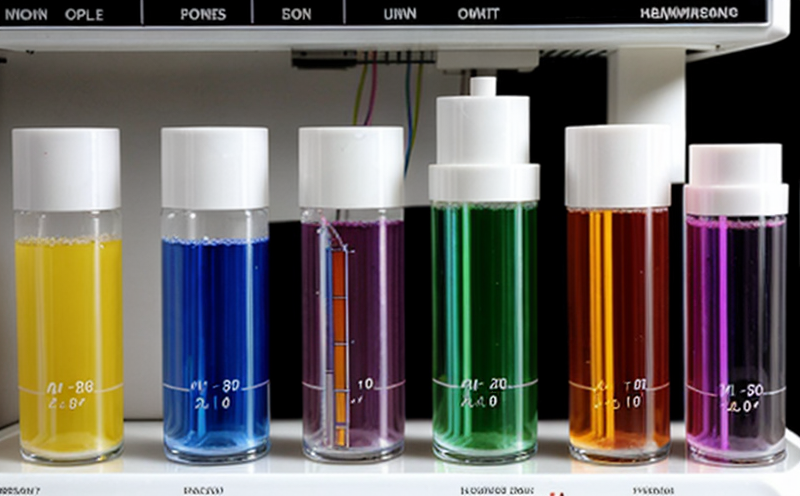JIS K0099 Wastewater Contaminant Testing by Chromatography
The Japan Industrial Standard (JIS) K0099 specifies a method for the determination of contaminants in wastewater using chromatographic analysis. This standard is crucial in ensuring compliance with environmental regulations and maintaining water quality standards across various sectors, including manufacturing, municipal services, and industrial operations.
Chromatography plays a pivotal role in identifying trace amounts of pollutants that might otherwise go undetected through other analytical methods. The process involves the separation of complex mixtures into their individual components for precise quantification and qualitative assessment. In wastewater analysis, this translates to detecting hazardous chemicals such as heavy metals, organic compounds, and pharmaceutical residues.
The methodology outlined in JIS K0099 requires a multi-step procedure that includes sample preparation, chromatographic separation using high-performance liquid chromatography (HPLC), and detection via ultraviolet-visible spectroscopy or mass spectrometry. This approach ensures accurate quantification of contaminants down to parts per billion levels.
Our laboratory adheres strictly to this standard, ensuring reliable results that are traceable and reproducible. Our team is equipped with state-of-the-art instrumentation, including advanced HPLC systems capable of handling a wide range of samples from different industries. We also employ trained personnel who maintain current knowledge on the latest developments in chromatographic techniques.
One of the key challenges when dealing with wastewater contaminants lies in achieving consistent sample preparation and maintaining rigorous quality control measures throughout the analytical process. Our laboratory excels at these aspects, providing clients with confidence that their results are accurate and reliable.
The importance of adhering to JIS K0099 cannot be overstated, especially for industries subject to stringent environmental regulations. By offering comprehensive testing services based on this standard, we empower our customers to make informed decisions regarding water treatment processes and pollution control strategies.
Industry Applications
| Industry Sector | Contaminant Type | Testing Methodology |
|---|---|---|
| Municipal Water Services | Nitrate, Phosphate, Organic Matter | HPLC with UV-Vis detection |
| Pharmaceutical Manufacturing | Pharmaceutical Residues | LCMS (Liquid Chromatography-Mass Spectrometry) |
| Chemical Processing | Heavy Metals, Organic Solvents | HPLC with fluorescence detection |
| Food and Beverage Production | Bisphenol A (BPA), Phthalates | GCMS (Gas Chromatography-Mass Spectrometry) |
The versatility of JIS K0099 makes it applicable across numerous industries, each having unique contaminant profiles and regulatory requirements. Our laboratory can tailor its services to meet the specific needs of different sectors while ensuring compliance with relevant standards.
Eurolab Advantages
At Eurolab, we pride ourselves on delivering unparalleled quality in every service provided. Here are some key advantages that set us apart:
- Accurate Results: Utilizing cutting-edge technology and adhering strictly to international standards ensures precision in our findings.
- Comprehensive Reporting: Detailed reports provide insights beyond mere numbers, helping clients understand the implications of their test results.
- Swift Turnaround Times: Efficient processes allow us to deliver timely reports without compromising on quality.
- Expertise in Multiple Fields: Our team comprises specialists from various backgrounds who can address diverse analytical needs.
- Robust Quality Assurance Program: Regular audits and adherence to best practices ensure consistent performance across all our services.
- Client-Centric Approach: We work closely with clients to understand their specific requirements and provide customized solutions.
These advantages reflect our commitment to excellence, making Eurolab the premier choice for wastewater contaminant testing by chromatography.
Environmental and Sustainability Contributions
- Reduction of Pollution Risk: By identifying contaminants early through accurate testing, we help prevent environmental degradation.
- Enhanced Resource Efficiency: Our services contribute to more efficient use of resources by informing better waste management practices.
- Improved Public Health: Cleaner water supplies result from effective contaminant detection and mitigation efforts.
- Sustained Compliance with Regulations: Ensuring compliance helps businesses avoid penalties and maintains a positive public image.
- Eco-Friendly Operations: By minimizing the release of harmful substances into wastewater, we support greener operations within industrial settings.
- Support for Sustainable Development Goals (SDGs): Our work aligns with global initiatives aimed at reducing pollution and promoting sustainable development.
Our services not only address immediate environmental concerns but also contribute to long-term sustainability goals, making a positive impact on both local communities and the planet as a whole.





